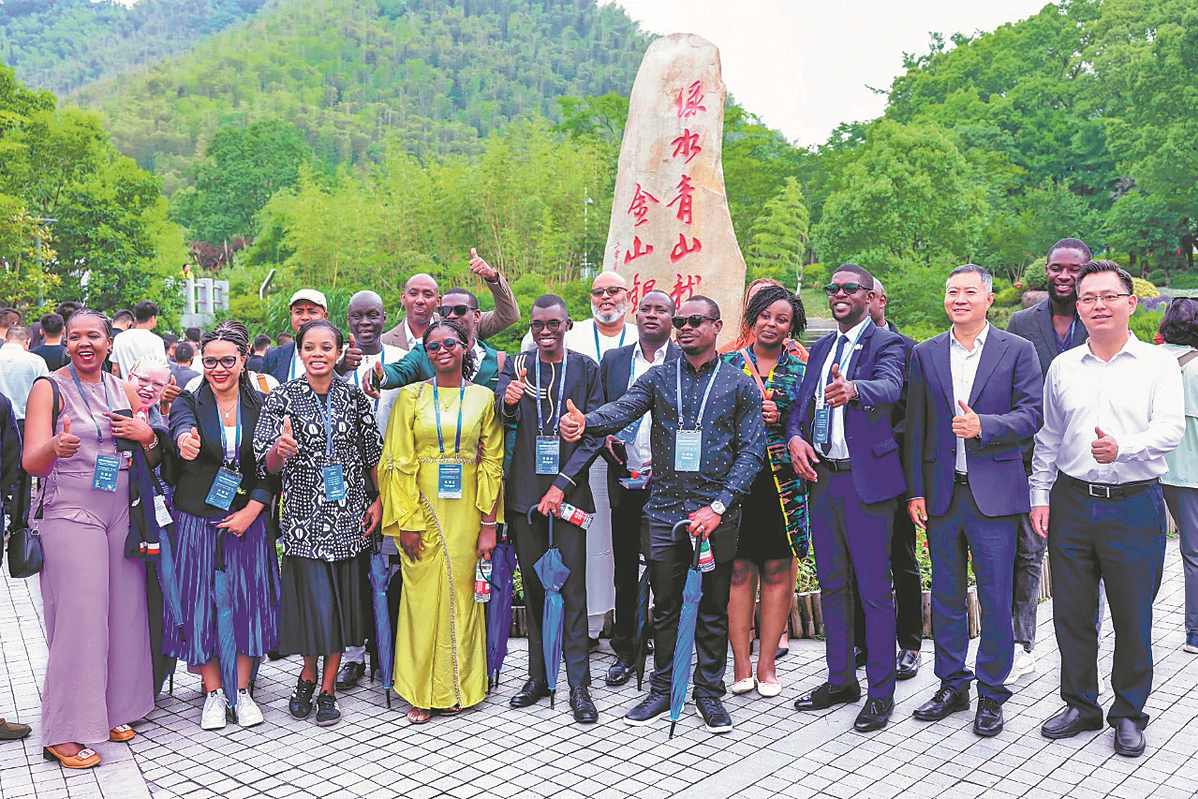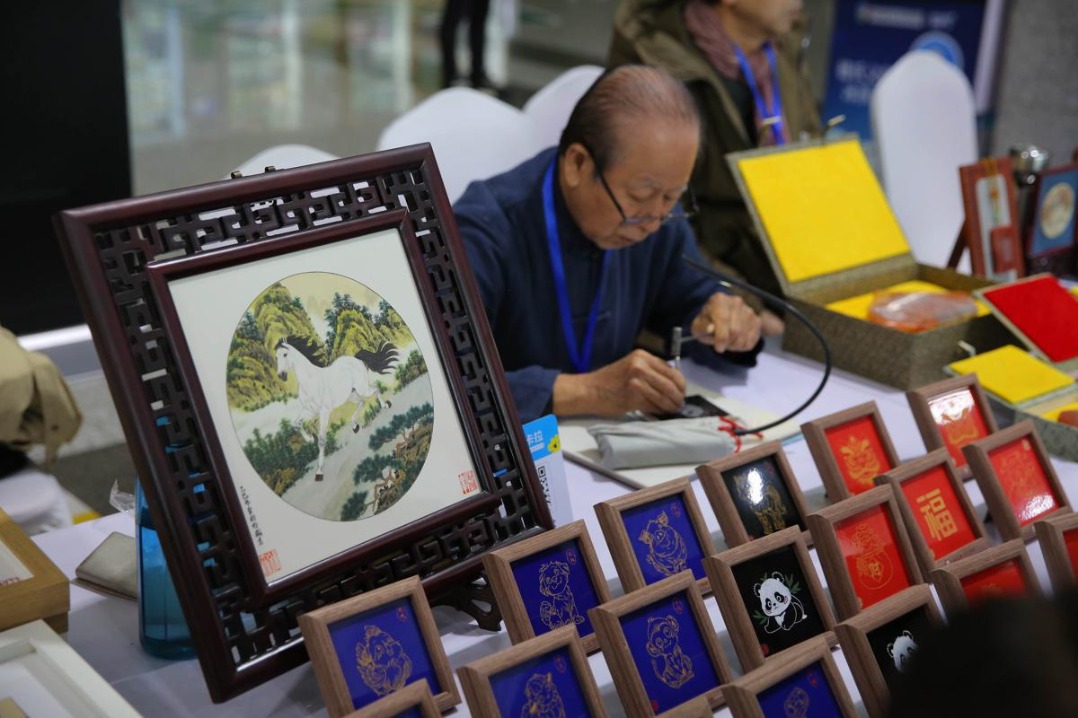Vision turns county into green model
Anji proves environmental protection, economic growth can go hand in hand


On a wooden shelf in his three-story home in Anji county of Zhejiang province, Ge Yuande keeps a stone — smooth, pale and vaguely shaped like a miner wearing a helmet — as the most treasured piece in his collection.
The 63-year-old picked it up more than 20 years ago from a quarry in Yucun, his native village in Anji, where he once made a living extracting and selling stone. Back then, the hills were stripped bare, the air was thick with dust, and streams ran gray with industrial runoff.
"I used to sell stone to make a living," Ge said in his living room, now lined with shelves full of stone sculptures. "But back then, it polluted everything. Now I still sell stone — but as art and as culture."
Yucun's transformation — from a dusty quarry village to a model of rural vitalization and green development — epitomizes China's heightened emphasis on sustainable growth over the past two decades.
In 2005, the village was standing at a crossroads. Its last quarry had just been closed, a decision that left villagers anxious about their livelihoods. The village's collective income plummeted from 3 million yuan ($417,600) to just 300,000 yuan that year.
At this pivotal moment, Xi Jinping, then secretary of the Communist Party of China Zhejiang Provincial Committee, visited the village on Aug 15, 2005, and offered residents a powerful message of reassurance.
During a meeting with villagers, Xi said the closure was a "wise step" and introduced what would become a guiding principle of China's environmental policy: "Lucid waters and lush mountains are invaluable assets."
In a column published in Zhejiang Daily a week after the visit, Xi expanded on the idea: "By transforming ecological and environmental strengths into advantages in eco-agriculture, eco-industry and eco-tourism, lucid waters and lush mountains can truly become invaluable assets."
In 2020, Xi — now Chinese president and general secretary of the CPC Central Committee — returned to the county. The phrase "lucid waters and lush mountains are invaluable assets" had by then become a national consensus and a core tenet of China's new development philosophy.
"Experience has shown that economic growth cannot come at the expense of the environment," Xi told the villagers.
Yu Xiaoping, deputy Party secretary of Yucun village, said the closure of quarries and continuous environmental improvements had opened up space for eco-tourism. Visitors now come for river rafting, fruit picking and rural guesthouse stays.
Zhang Jianguo, executive vice-dean of the Institute for Sustainable Development at Huzhou University, noted that by prioritizing green, low-carbon development and preserving its environment, Anji has translated ecological assets into real economic and social gains.
By giving top priority to environmental protection, the county has ensured that its air quality remains excellent on more than 90 percent of days. Surface water, drinking water and cross-boundary water all consistently meet national standards.
Over the past 20 years, the average annual per capita disposable income of Anji's rural residents rose from 7,034 yuan to 48,879 yuan — a nearly sevenfold increase.
"Anji's long-term, consistent approach to preserving its environment has produced a compelling case study in sustainable development — one with growing relevance not only in China but globally," Zhang said.
Enhanced protection
Today, more than 70 percent of Anji is covered in forest, much of it bamboo. Once-overlooked villages are now home to pocket parks, hiking trails, open-air teahouses, and even artisanal coffee shops.
Zheng Xuli, a senior engineer at Lingfengsi Forest Farm, patrols 120 hectares of forest land. Once a logging supervisor, he now focuses on conservation — from monitoring of termite infestations to forest maintenance.
"In the past, forestry was about cutting and planting," Zheng said. "Now it's about watching, caring and minimizing harm."
The biggest shift, he said, has been philosophical: "We treat the forest as an asset that gains value over time — not something to consume."
Technology is also reshaping how Anji protects its environment. AI-powered drones and autonomous boats are now used to monitor rivers for illegal dumping and construction.
"Before, it took weeks to patrol all our waterways," said Ye Liang, director of the river chief office with Anji county's water resources bureau. "Now drones and AI can do it in a single day. Problems are caught early, before they escalate."
In 2022, Anji launched the Global Partnership Initiative, aimed at attracting digital nomads, green startups and remote workers to settle in the county.
To local officials' surprise, the initiative gained rapid momentum. By the end of 2024, more than 50,000 young people had come to Anji to start businesses or seek job opportunities.
Xu Liang, a cyclist and entrepreneur, said Anji's location near Yangtze River Delta cities and its clean environment are major draws for young professionals.
"For many young people, the countryside is more than a retreat," Xu said. "It's a place to explore new ideas, new directions and entrepreneurial opportunities beyond the city."
Javier Ghaemi, a British expatriate, arrived in Anji in April with his girlfriend after a friend in Shanghai told them about a gym for rent. Within hours, they had made the decision to move from Malaysia to the county.
They took over a dormant gym nestled in the hills and transformed it into a lifestyle hub offering yoga classes, wellness workshops and forest hikes.
From his gym, perched above a bamboo grove, Ghaemi has found both peace and purpose.
"For me, I want to help build Anji up," he said. "To promote it, and to show Westerners the reality of life here. I think the misconceptions are huge. Even if I can just show a few friends, have them visit, do a workout — they'll see that we're all the same. We all have the same dreams."
Patrick Nijs, former Belgian ambassador to China, said that Xi demonstrated a clear vision when he proposed the philosophy that "lucid waters and lush mountains are invaluable assets" in 2005.
"Back then, most people were still debating what 'going green' even meant," Nijs said. "So he introduced this concept in a very clear and poetic way — something that resonates deeply with the Chinese mind."
Nijs now considers Anji one of his homes. "I'm a big fan of Xi Jinping because I think he is a visionary," he said.
What Anji offers, Nijs added, is a development model rooted in culture, continuity and care.
He pointed out that this philosophy has also underpinned China's sweeping investments in renewable energy. "China has invested in all facets of green energy — hydropower, solar panels, biomass, wind power and nuclear power — and is now a global leader."
Contact the writers at xuwei@chinadaily.com.cn

- Taiwan businessman: Taiwan compatriots will see more opportunities in next five-year plan
- Xinjiang reports highest foreign trade growth in China
- Harbin authorities demand return of pensions paid out to deceased
- Global research project on AI guardrails launched in Beijing
- Partnering with China, embracing opportunities
- China's cyberspace regulators announce measures for protection of minors



































